
Few figures in the Bible, and indeed the history of Western thought, loom as large as Sarah and Abraham from the Book of Genesis. Abraham’s willingness to sacrifice their son Isaac has inspired the imaginations of artists throughout the ages, from Caravaggio and Rembrandt, who each famously painted the scene, to the Danish philosopher Søren Kierkegaard, who crafted an influential interpretation of the sacrifice in Fear and Trembling. The story is among the most controversial and well-known in the Bible, evoking disgust, befuddlement, inspiration and rich theological exegesis alike. To capture the grand ethos of this tale in a 90-minute movie is a challenge, to say the least.
If any group could surmount the challenge, it’s Angel Studios, the crowdfunded media agency responsible for « The Chosen, » that beloved — and wildly successful — series about Jesus and his followers. Tackle the story they did — to a debatable degree of success. « His Only Son, » a feature debut from director David Helling, appeared in select theaters on March 31 and will soon be available to stream on Angel Studios.
Most of « His Only Son » takes place immediately after God commands Abraham (played with finesse by the Lebanese actor Nicolas Mouawad) to sacrifice Isaac (played by up-and-coming Israeli American actor Edaan Moskowitz), during the physically treacherous and emotionally tumultuous three-day journey to Moriah.
Interspersed throughout Helling’s interpretation of the journey are flashbacks that show the « greatest hits » of Abraham’s life. Here is God commanding Abraham to reject polytheism and worship God alone. Here is God promising Abraham his descendants will be as numerous as the stars. Here is an agitated Sarah (played by Iranian actress and activist Sara Seyed) urging Abraham to have a child with her maidservant, Hagar. And here, at long last, is the birth of Isaac to his now grey-haired mother.
Despite man’s confusion, God was — and is — always present. None of us are ever truly alone.
The movie is almost a scene for scene account of Genesis 12 through 22, and it’s impressive how much attention to detail went into the script. Sunday school teachers in search of a visually accurate portrayal of Father Abraham need look no farther than « His Only Son. » Christians hoping for a film about the Bible that might interest their secular friends — like, say, « The Chosen » — may need to think again.
It’s difficult to get past the movie’s visual blunders — the sepia hue, the overuse of slow motion, and the stage makeup that does not quite convince viewers of old age (at the birth of Isaac, Sarah is supposed to be older than 90 years old, but she looks no more than 40). Then there is the portrayal of God. How does one successfully convey on screen what it’s like to commune with humanity’s Creator?
It may not be possible to do so — which again speaks to the enormous challenge at the heart of this film — but a shimmery, white-robed man with a pleasant, echoing accent is probably not the best way to go. The movie tries to make Abraham’s faith in God’s promises inspiring — but it’s difficult to feel inspired by a man willing to kill his own son. And it’s difficult to find oneself swept away by the drama of a story when we know how it ends.
That said, what shines in « His Only Son » is its humanness. Sarah, Abraham and Isaac — those giants of Genesis — are made small by the big screen. There are dangerous horsemen and a burning city and hallucinogenic visions, yes, but this is not Darren Aronofsky’s « Noah. »
Abraham’s world is ordinary. His people are shepherds. His land is a bunch of small, bare and windy hills. He and his wife try, and fail, and try again to understand God’s enigmatic promises. They wait decades for a child. They hurt vulnerable people (namely, Hagar and Ishmael). They are long-suffering.
In this way, despite the story occurring 4,000 years ago, the movie uncovers a relatable tale. Who among us is unfamiliar with praying to God, and then waiting years on end for an answer that makes sense, that seems good? Who among us has not received something we wanted only to have it snatched away? Who among us has not wondered how to remain faithful amidst endless, unfulfilled longing?
Toward the end of the movie, a distraught Abraham says, « Whatever he’s doing in all this, whatever he’s trying to teach, whatever he’s trying to show, I’m lost. » Haven’t we all been there? « His Only Son » serves as a reminder that even the greatest, most faithful figures in the Bible were mere humans who suffered and struggled to fathom God’s will. And despite man’s confusion, God was — and is — always present. None of us are ever truly alone.
Advertisement
« His Only Son » further uncomplicates the sacrifice of Isaac by providing a standard, straightforward interpretation: the story prefigures the crucifixion of Christ. Both subtle and blunt allusions to the cross are sprinkled throughout the movie, including a tender moment when Abraham breaks bread while speaking about the meaning of sacrifice, and the final scene, which flashes forward 2,000 years to give us a glimpse of Christ on Golgotha.
In perhaps the most moving scene, Abraham begs God to take his life instead of Isaac’s. Staring into Abraham’s troubled face, one catches a glimpse of both the pain and unfathomable love God the Father must have felt when Jesus was crucified.
God’s sacrificial love is the center of the Christian faith. And yet, we can easily become inured to this love, to this story. « His Only Son » invites us to remember. The movie is not perfect. But the message at its heart — the reminder of God’s love — is good.



